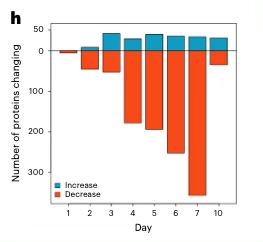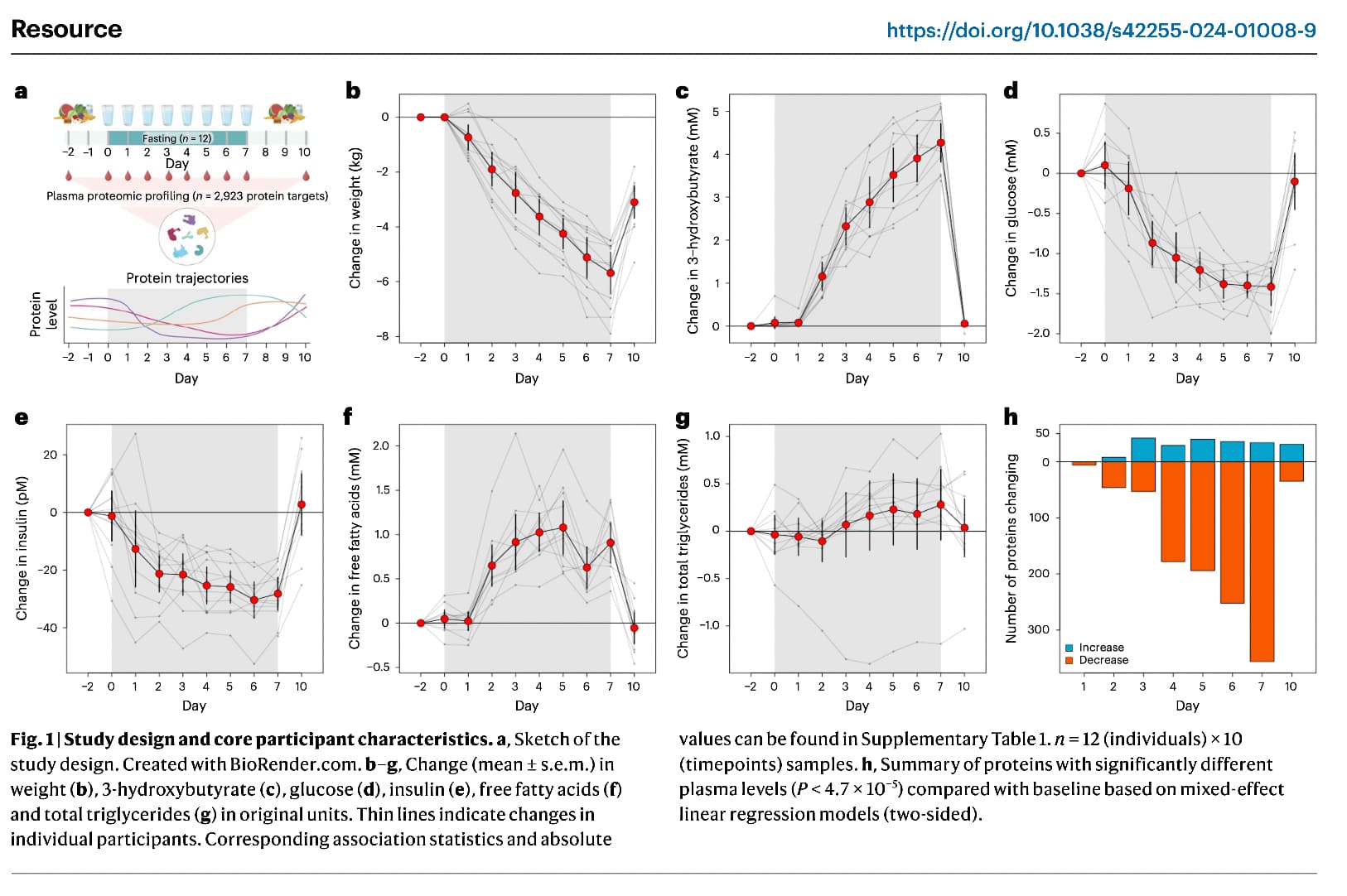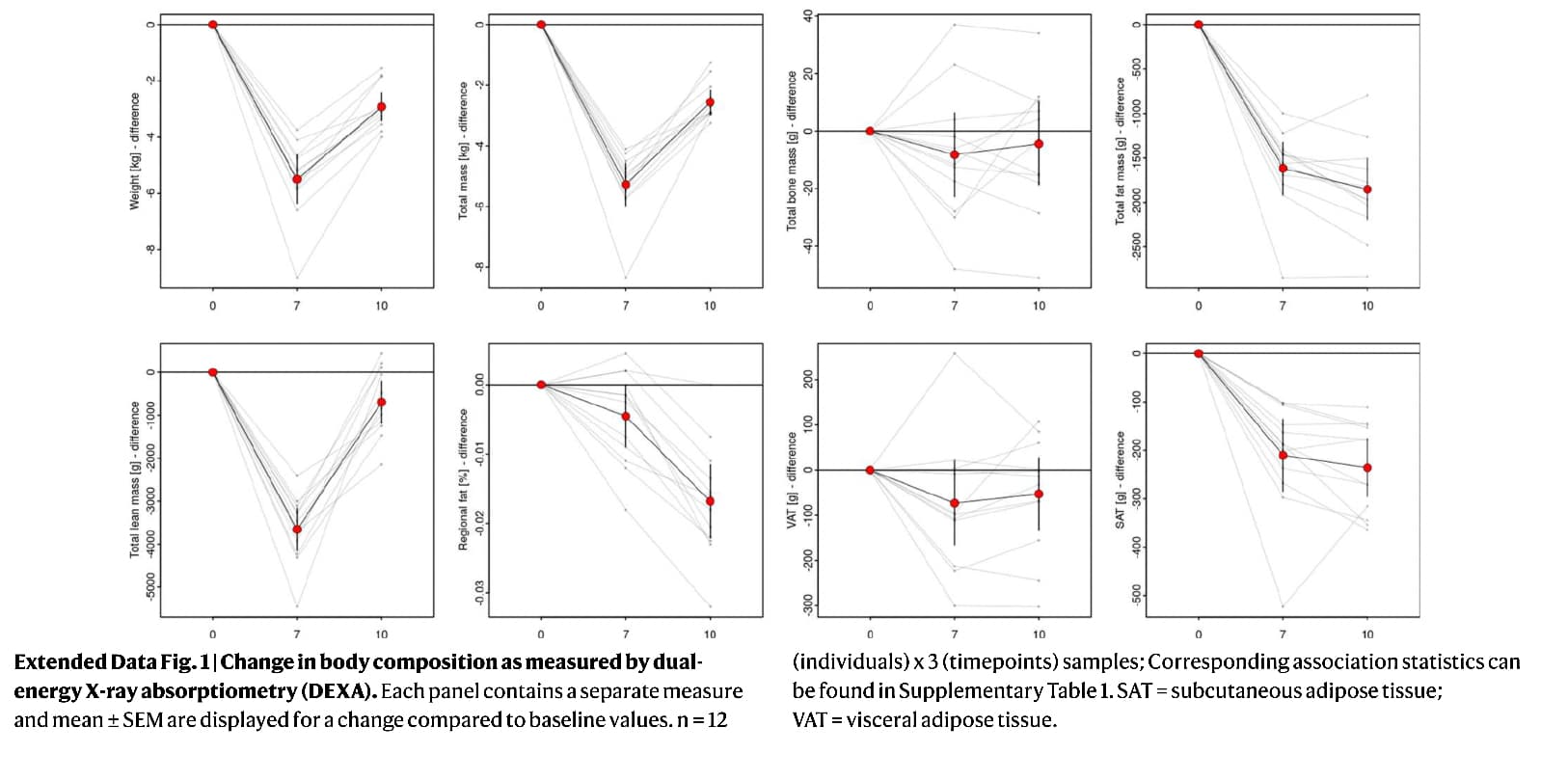Who can get the full paper? This look very interesting.
I think some of the secondary source databases will take a few days to update.
I am experimenting with a subscription to DeepDyve and that may provide access to this.
One of the authors has put up this sharing link:
“We observed a homogeneous, multi-organ response across volunteers affecting a third of the plasma proteome that segregated into different temporal clusters of responding pathways and organ systems, with profound systemic changes not occurring until after 3 days of fasting.”
This probably explains why I have never been able to tolerate more than 3 days of water fasting. My body only just starts shifting into “other” mode just as my discomfort hits maximum. In addition, I didn’t know that 1 more day would make all the difference (3 days maybe doesn’t do anything?)
" We observe little evidence of an effect of those proteins on health outcomes that change significantly[…]early on, that is, after a short period of fasting of less than 2 days , except for lipid metabolism-related proteins such as PCSK9, LPL or ANGPTL4. In contrast, proteins that change late and after three or more days of fasting show diverse effects on multiple health outcomes…"
" Our results suggest that large changes in the plasma proteome of healthy volunteers, possibly indicative of a positive health impact over and above weight loss, are not detectable after 2 or even 3 days of prolonged food deprivation."
The word “autophagy” does not appear in the study paper.
So, weight loss aside, the benefits of fasting come after 3 days plus of fasting? I wonder if rapa can accelerate that timeline?

Maybe certain benefits of fasting kick in after 3 days, but others begin much sooner. Insulin sensitivity goes up as the body slowly draws down its glucose stores - I’d bet that improves within 24 hours. For those who are normally insulin sensitive, this may not be a big benefit, but for others I’d bet that counts as a win. I believe that giving your digestive system a prolonged break is a great way to let it rest and restore itself. The few times I’ve done any significant fast, I’ve loved how quiet and happy my stomach, etc. feels. And then there’s autophagy - we don’t seem to have a good idea when that gets ramped up significantly, but I’d think that it begins to get dialed up after about 24 hours. But I’m just speculating.
A really interesting paper… It would be even more interesting to do something like this with rapamycin at different dosing levels (combined with fasting) to see the comparable effects…
That is one seriously dense paper. I really couldn’t follow most of it as i don’t know the protein abbreviations by heart; its pretty interesting use of a protein identification tech that didn’t exist when i was in the lab in the Middle Ages (the best we had was PCR and mass spec). But from what little i was able tp understand, many of the proteins reduced are from the endoplasmic reticulum, and then the largest impacts (in protein changes) start after four days but continue to build through the fast. But i didn’t see anything related to autophagy. And in fasting lore everyone talks about “recycling misfolded proteins” which supposedly reduces all kinds of problems. So maybe they didn’t measure this, or maybe this “fasting lore” BS.
I’m a layman. I make no effort to understand the engineering behind how the proteins are made or what each one does. But what I gathered was that the body has a program for energy shortages. The body starts reacting right away but the bulk of the program doesn’t engage until 3 x 24 hours. Then it starts shutting down many more protein’s manufacturing, while continuing to ramp up a few. No doubt autophagy is also occurring during this process, starting in the 12-18 hour post last meal, and then ramping higher to support the production of proteins. Fairly large weight loss. But the amazing part was how fast the body recovers its lean protein lost during the fast. We are built to tolerate long fasts.
The two or three days is the time it takes your body to enter a state of ketosis (fat burning rather than glucose). An extreme low carbohydrate diet preceding a fast would have you already in ketosis thus eliminating three days of needless suffering. I have been in continuous ketosis for two months, and fasting 23 hours per day for one month. Since I no longer experience extreme hunger or food cravings I think I’m ready to move forward with longer fasts of 42-48 hours. I’ve read studies where after prolonged water only fasting organs will shrink primarily due to fat loss and autophagy. Upon refeeding kidney, liver, pancreas, heart, and brain are essentially rejuvenated. Not a very
science-y comment I know.
Does this mean you eat all your food in 1 hr?
He is an omad. One meal a day. I like that too but my wife nags me for not eating.
Yes, I eat one meal per day. No carbohydrates at all.
How much protein are you able to eat with one meal?
I don’t measure as closely as I probably should, but it works out to an average of about 150-200 grams of protein per day. I’m currently about 76.5 kilos and 75 centimeters (5’9”).
A few days ago I bought 2 kilos of mixed pork and chicken skin from the butcher, threw a half kilo in a pot and added some beef and pork meat and made a kind of stew. So it’s hard to accurately gauge fat to protein ratio.
During the course of the day I also do a total of about an hour of bodyweight exercises. Planks, push-ups, squats etc.
surprisingly I never run out of energy and exercise is a breeze. My goal is to do this until I return to the US and then have lots of testing done (EKG, fibroscan, CBC, CT scans and X-ray, ultrasound, and other bloodwork) in six months.
My hope is that in six months all measures of metabolic health are in the optimal range. If they are I’ll continue with carnivore omad and occasional long fasts. If not I’ll tweek a few things.
I have run out of sirolimus, but I still have plenty of Dasatinib (but sadly no more Quercetin or fisetin).
Is there a reason you are doing this? Doesn’t sound terribly healthy or supported by science?
Oh, there is plenty of science to back up fasting…and extreme low carb as well. Search pubmed and NIH publications ![]() . Here’s my morning paper.
. Here’s my morning paper.
All interesting but doesn’t support omad do they?

